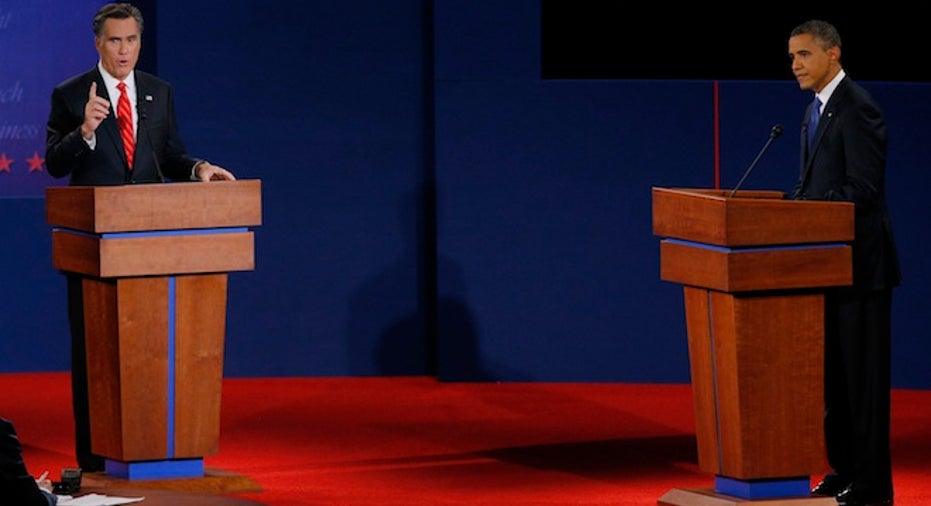Battle Lines Drawn in First Presidential Debate

The first presidential debate of the 2012 election season took a hardline focus on the economy, taxes and job creation. In their first showdown of three, President Barack Obama and Republican nominee Mitt Romney squared off on a number of issues over the 90-minute debate, but spent the first 30 minutes breaking down critical issues central to the economy – often going well over their allotted times.
Both candidates pledged to help boost the middle class, battled over tax plans and health-care reform and how to reignite the struggling economy.
Mitchell McKinney, professor of communication at the University of Missouri, said both candidates performed well throughout the debate and are likely to claim victory—but he argues one candidate stood apart.
“Overall, Mitt Romney’s performance was likely strong enough to silence the critics of his campaign, those from within his own party, and re-energize his supporters.”
Romney repeatedly offered personal anecdotes from the campaign trail – reminiscent of an Obama candidacy voters saw four years ago.
“Mitt Romney seemed full of facts and figures this evening, working hard to combat his ‘not enough specifics’ charge,” said McKinney, who also studies presidential debates.
Jobs
Out of the gate, the candidates sparred over the issue of job creation. After winning the coin toss, Obama took to the microphone first arguing four years ago, when the nation was faced with the worst financial crisis since the Great Depression, it was the resilience of the American people that made the country capable of fighting its way out. He followed up by saying the nation is not out of the woods and that the best way to kick start the economy is through investing in small businesses and using savings from ending two wars to make “critical investments” in reducing the deficit.
Romney agreed with the president’s assessment of the economy and identified job creation as the top contender to repair it. He reviewed his five-step economic plan first introduced during his speech at the RNC convention. His plan includes making North America energy independent, opening trade to Latin America, ensuring people have skills to succeed and schools necessary to make that happen, balancing the budget and championing small business.
Taxes
A hefty portion of the debate was spent discussing taxes and reform. Both candidates agreed tax reform is essential to providing economic growth and stability and that the middle class is at the heart of the matter, but they went head-to-head disagreeing on the fundamentals of tax reform.
“High-income people will do fine whether you’re president or I am,” Romney said. “Middle-income people are getting crushed and the question is how to get them going again.”
Romney said his solution won’t add to the federal deficit and though he won’t cut down on the amount high-income individuals contribute, his plan does not include increased taxes for the middle class. Romney said his push to lower tax rates, exemptions, and deductions will help reduce the nation’s budget deficit.
To boost job creation, Romney said his plan to lower the rate at which businesses are taxed will give them more flexibility to hire more workers and create more jobs.
Obama disagreed with Romney’s plan, arguing the best way to kick start a stalled economy is to cut taxes for middle-income families and raise the burden on higher-income households.
“We do best when the middle class is doing well and by giving them those tax cuts, they have more money in their pockets that they can use to buy a car,” he said. “That means businesses make more money and they can pay more employees.”
But perhaps the biggest item of contention during the debate was the tax breaks and loopholes included in Governor Romney’s plan. The two sparred for several minutes on just what is included in the governor’s plan.
Federal Deficit
Romney argued the federal deficit is not just an economic issue, but a “moral one” since the massive $16 trillion hole will be passed on to the next generation. He said of the three ways to reduce the debt and deficit – raise taxes, cut spending, and spur economic growth– the president has had to recall his own words on the campaign trail back in 2008 when he said the worst thing to do in a down economy is to raise taxes. Romney promised to eliminate a slew of government programs and lower spending to encourage economic growth.
Obama fought back and said he’s done the things the governor proposes including cutting under-performing and unnecessary programs, reducing medical fraud, and slashing nearly $1 trillion of discretionary domestic spending. He said the best idea for the economy going forward is to ask for $1 in additional revenue from wealthy Americans for every $2.50 cut.
Though each candidate outlined their proposals, both continued to bolster their campaign rhetoric and McKinney said Obama seemed to be less direct to Romney’s attacks than what he’s known for and produced in previous debates.
“In several instances, President Obama failed to respond to a number of direct Romney attacks, such as Obama’s energy policy or his inability to reduce the federal deficit,” McKinney said. “Other examples of Obama’s seeming to pass on an opportunity to take on Mitt Romney was in the entitlement question. Here was a clear opening for Obama to point out Romney’s 47% remark, yet no mention of this from Obama.”



















